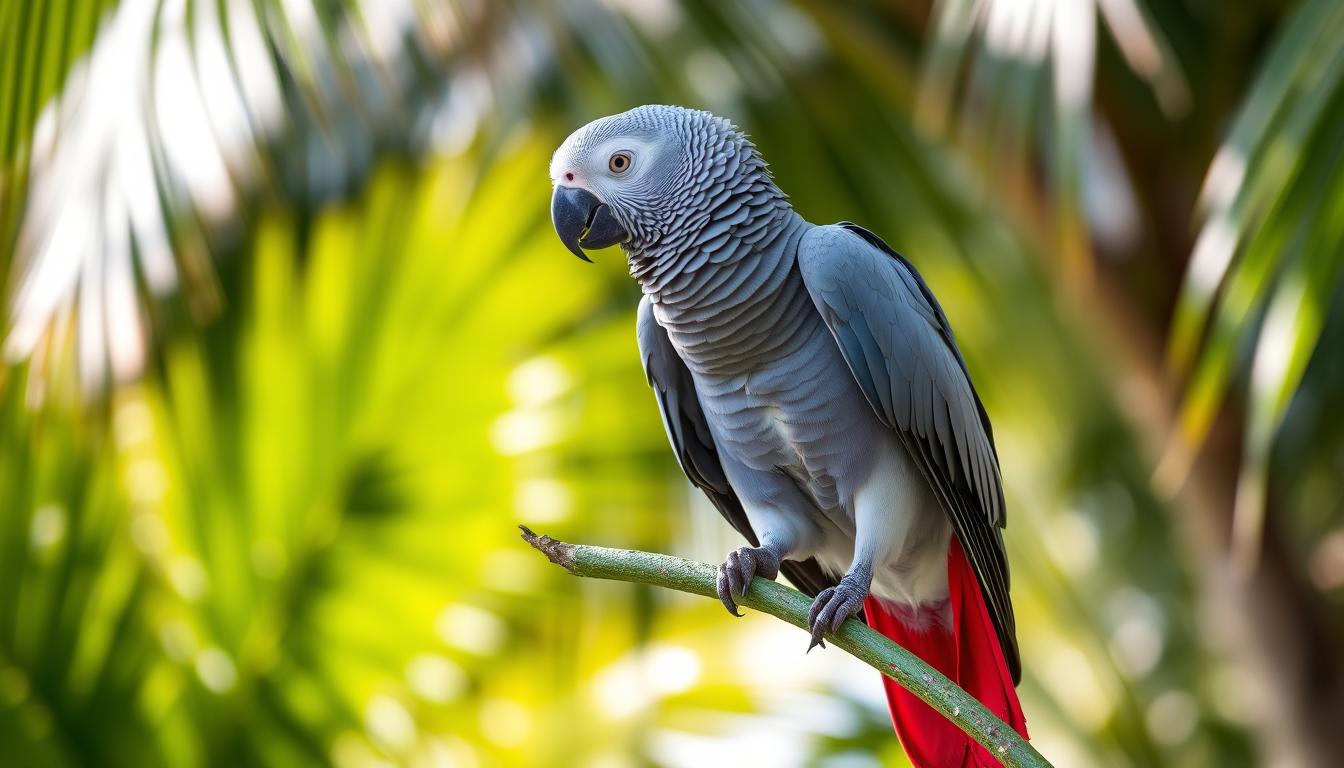Due to its high intelligence and colorful plumage, the African grey parrot is one of the most preferred exotic pet. They can mimic human words and understand complex commands, so they are bright birds. As an African grey parrot pet, they have amazed bird fanciers and experts across the globe with not only their exceptional way with words, but their reaching bond with their owners.
If you’re considering getting an African grey parrot as a pet or already have one, it would be helpful to learn about what makes this bird unique. From feeding them to housing them, in this guide experts will share how to take care of these loving and intelligent birds. You’ll learn all about the pros and cons of having an African grey parrot at home, and how to properly care for them.
Key Takeaways
- Having an African grey parrot as a pet means the bird needs to be mentally stimulated since they are very intelligent.
- A balanced diet and proper living environment are crucial for their health.
- Regular veterinary check-ups and socialization are essential for their well-being.
- African grey parrots can live up to 50 years or more with proper care.
- Patience and consistency are key when training and bonding with your African grey.
Introduction to the African Grey Parrot
Due to its intelligent behavior and attractive appearance, the African grey parrot is loved by numerous people. These birds are native to the rainforests of West and Central Africa and are easy to identify by their grey bodies and bright red tails.
Because the African grey parrot is considered an exotic pet, it tends to be a people lover. They are friendly animals and also quite intelligent who can solve many problems and learn a lot of words.
“African grey parrots are not just pets; they are lifelong companions that require dedication, patience, and a deep understanding of their unique needs.” – Dr. Laurie Hess, Avian Veterinarian
Before getting an African grey parrot as a pet, you should realize that they might live for 60 years, which means you have to be committed for many years. For them to be happy and healthy, they must receive lots of care, attention and mental activities.
This guide will explore the amazing birds in more detail. We will discuss how they think, the main kinds of pets, their average lifespan, what they should eat and the right places for them to live. With proper African grey parrot care, you can ensure your bird lives happily.
African Grey Parrot Intelligence and Cognitive Abilities
It is well known that African grey parrots can talk and understand language very well. They have the power to learn countless words and phrases, and the thing that makes them different is their skill in using them and understanding their meaning.
Problem-Solving Skills
African Grey Parrots are able to solve problems very well. They have the ability to use different objects and work out tough puzzles. It proves that birds with this ability use a different kind of thinking.
“It has been seen that African grey parrots use tools to get food, which proves they can think logically and solve problems.”
Researchers have tested how smart African Grey Parrots are at solving problems. The results show they are very good at it. For example:
- In one study, the parrots faced a series of tough puzzles. They learned from their mistakes and got better at solving them.
- Another test hid food in different spots. The parrots showed great memory and could find the food easily.
Vocabulary and Language Comprehension
African grey parrots are known for their amazing language skills. They can learn hundreds of words and phrases. What’s special is they use words correctly and understand their meanings.
Irene Pepperberg studied Alex, a famous African grey parrot, and his findings helped us learn more about the intelligence of birds. Alex could:
- Identify objects by color, shape, and material
- Understand numbers
- Answer complex questions
- Tell what he wants using words
Although Alex is the most famous parrot, a lot of other African greys can still bond with their owners through communication. They can use words in the right way, demonstrating that they understand a lot.
African Grey Parrots can learn many words, like:
| Category | Examples |
|---|---|
| Foods | apple, banana, carrot, nuts |
| Objects | ball, cup, keys, phone |
| Colors | red, blue, green, yellow |
| Numbers | one, two, three, four |
| Greetings | hello, goodbye, good morning |
As an exotic pet, having an African grey parrot pet can make a great friend. Nevertheless, these birds need a lot of attention and proper care. Pets stay happy and healthy when they get enough attention, are involved with people and live in a cozy and interesting place.
Different Types of African Grey Parrots
When deciding on an African grey parrot as a pet take into consideration there are two primary species: the Congo and the smaller Timneh. Even though they are both highly intelligent and capable of speech, they don’t look alike or act alike.
Congo African Grey Parrot
Congo African grey parrots are bigger than the Timneh African grey, at a length of 13 to 14 inches. They are quite noticeable birds because they have grey feathers and a red tail. They are known to be outgoing, and many of them enjoy spending time with people. They usually adjust more quickly when faced with new situations and places.
Timneh African Grey Parrot
The Timneh African grey parrot is not as big as the other types and measures 9-11 inches. They have a dark grey color on their feathers and a maroon tail. Timnehs usually take a while to adjust and may appear shyer than other pets. When pets are with their owners, they become very devoted and loving.
Regardless of whether people prefer the Congo or Timneh African grey parrot, choosing is mainly guided by the pet owners’ interests and involvement in their pet’s personality. Both pets require a big cage, the correct food, regular visits to a vet and lots of activities to be happy and healthy.
African Grey Parrot Lifespan and Longevity
An African grey parrot pet calls for many years of dedication from the owner. If they are well looked after, parrots can live for more than 40 years in captivity. In which place are they located? For decades, you should treat your pets as your special friends and care for them.
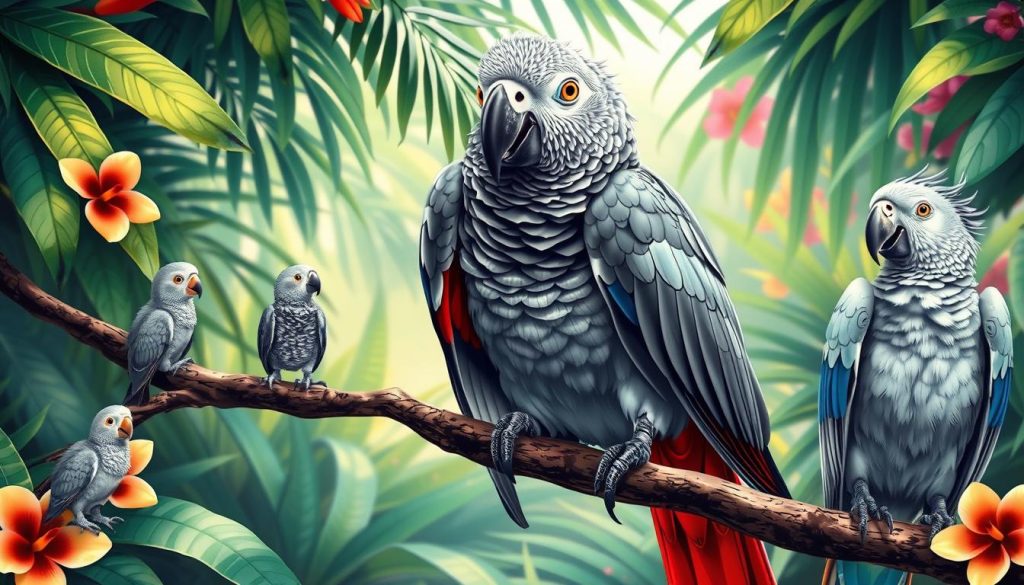
The following are some of the reasons why the African grey parrot bird tends to survive much longer. They need a healthy diet, which includes pellets, fresh fruits and veggies, to keep them healthy. Regular trips to the vet also help to catch and treat health issues when they are young. Mental exercise is a significant part of their longevity.
You can do this by keeping them entertained with toys, puzzles and a lot of playtime. Regular training serves to strengthen the bond between you and your parrot while also giving them the physical and emotional stimulation they need.
“African grey parrots are more than just pets; they are lifelong friends who need substantial time and resources to care for them properly. It is so important for potential owners to think long and hard about if they can provide the right level of care and attention to these fantastic birds for potentially several decades ahead before they take the plunge of bringing one of these fantastic animals into their lives.”
Knowing the lifespan of African grey parrots is crucial for those who are considering getting one. By dedicating yourself to their well-being and offering them a home that is full of good food, good companionship, and mentally stimulating activity, you and your exotic pet can enjoy a long, happy, and healthy life together
Proper Diet for African Grey Parrots
The health and happiness of your African grey parrot depend mostly on a balanced diet. It matters to understand the foods that are good and those that are harmful for them. This information allows your parrot to live for many years in good health.
Essential Nutrients and Foods
Their diet should include all the nutrients they need. These include:
- Protein: Found in high-quality pellets, nuts, and cooked eggs
- Calcium: Provided by leafy greens, cuttlebone, and calcium supplements
- Vitamin A: Abundant in dark leafy greens, carrots, and sweet potatoes
- Omega-3 fatty acids: Present in nuts, seeds, and specially formulated supplements
Adding a mix of fresh fruits and vegetables to their diet is also key. These foods give them vitamins, minerals, and fiber. Great options include:
| Fruits | Vegetables |
|---|---|
| Apples (without seeds) | Broccoli |
| Bananas | Carrots |
| Berries | Kale |
| Melon | Spinach |
| Papaya | Sweet potatoes |
Foods to Avoid
Even though you should feed your pet different foods, some are not healthy for your African Grey Parrot. These include:
- Avocado
- Chocolate
- Caffeine
- Alcohol
- Salty or sugary treats
A healthy and happy African grey parrot depends on having a balanced diet. Offering your pet the proper nutrients and avoiding unhealthy foods will assist in giving them many years of happiness with you.
Ideal Habitat for Your African Grey Parrot
You should make sure your African grey parrot’s home is perfect for its well-being and happiness. When your parrot’s habitat has the proper size, plenty of toys and is kept at a healthy temperature and humidity level, it will be happy and healthy.
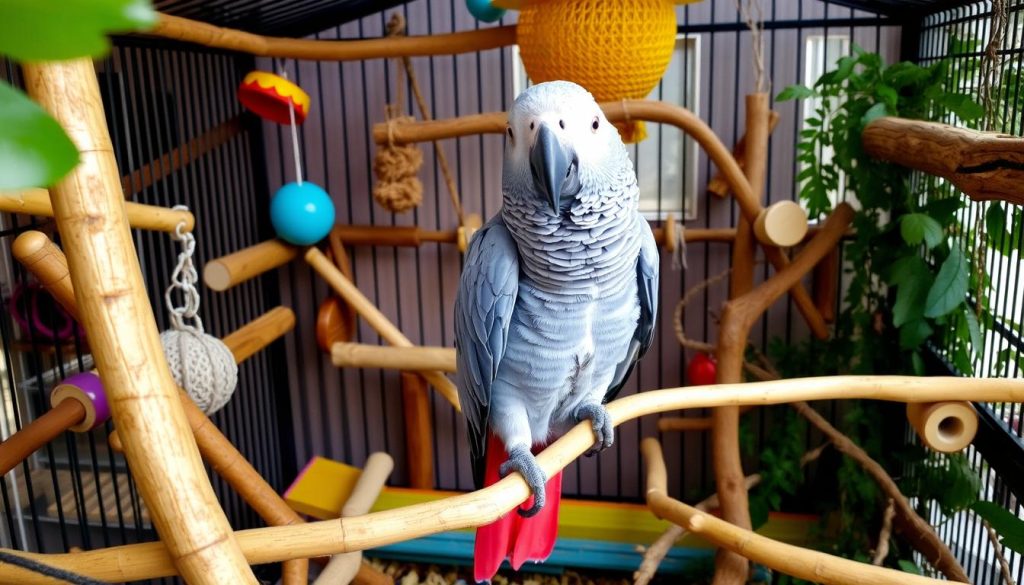
Cage Size and Requirements
Make sure your African grey parrot pet has a big enough cage to move, climb and play in. The cage should be at least 24 inches wide, 36 inches long and 48 inches tall for a single parrot. Make sure there are no more than three-quarters of an inch between the bars to keep your parrot safe.
Toys and Enrichment
To keep your African grey parrot bird happy and healthy, you should provide an enriched environment. Put up perches, toys and other interactive things to help your pet display its natural behaviors. Using various-sized perches helps pets’ feet, and switching toys from time to time encourages your pet to play.
These are some activities you can do with your African grey parrot pet:
- Wooden blocks and chewing toys
- Rope perches and swings
- Foraging toys filled with treats
- Puzzle feeders and interactive toys
- Mirrors and bells for visual and auditory stimulation
Temperature and Humidity Control
Temperature and humidity must be kept at the right level for your African grey parrot care. They like to live in areas that have temperatures between 65°F and 80°F (18°C to 27°C). Keep an eye on the temperature with a thermometer and change it using heaters or air conditioners.
Proper humidity levels are essential for the health of both your pet’s skin and its feathers. The best range for clothes is from 50% to 70%. To keep humidity, try using a humidifier, spraying your parrot often or setting a small water dish close to the cage. It is helpful to have a hygrometer to check and change humidity as required.
| Environmental Factor | Recommended Range | Maintenance Tips |
|---|---|---|
| Temperature | 65°F – 80°F (18°C – 27°C) | Use a thermometer and adjust with heaters or air conditioning |
| Humidity | 50% – 70% | Use a humidifier, mist regularly, or provide a shallow water dish; monitor with a hygrometer |
A comfortable and enjoyable environment in your home makes your African grey parrot feel better and can help improve your well-being too.
African Grey Parrot Care: Grooming and Health
The African grey parrot care that is important is not just what you should feed and how you should house your bird, but grooming and health care are very important. Taking care of the health of your African grey parrot pet by grooming it regularly will give it a long and happy life.
It is essential to trim your parrot’s beak and nails because it helps them feel and stay healthy. If the beak or nails get too long, they may bother your pet and result in health complications. Check your parrot’s beak and nails from time to time and whenever you need them trimmed, have a professional handle it safely.
Taking care of your pet’s hygiene by bathing is also necessary. African grey parrots enjoy bathing and preening and this is good for their feathers’ cleanliness. Another way is to offer them a dish of water to bathe in or spray them with water from a spray bottle. The water for their bath should be slightly warm, and someone should always supervise them to avoid any accidents.
Pets need health care as much as they need to look clean. You should take your parrot to the vet regularly to monitor their well-being. It is important to bring periodically your African grey parrot to an avian vet for examinations, shots and helpful advice. A proper diet helps keep their health in good condition. A good diet for your parrot is pellets, fresh fruits, vegetables and treats every now and then.
- Trim beak and nails regularly
- Provide opportunities for bathing
- Schedule routine veterinary check-ups
- Feed a balanced and nutritious diet
| Grooming Task | Frequency |
|---|---|
| Beak and nail trimming | As needed, typically every 4-8 weeks |
| Bathing | 1-2 times per week |
| Veterinary check-ups | Annually or as recommended by your vet |
Taking care of your exotic pet with proper grooming, diet and medical attention will make it stay happy and healthy for years. Grooming your parrot regularly ensures it is healthy, looks good and is happy.
Training and Socializing Your African Grey Parrot
Training and socializing your African grey parrot is an important part of caring for your parrot. Investing in your parrot’s needs helps you create a close relationship and also keeps them content, healthy and well-adapted. Training your African grey parrot on a regular basis and giving it lots of kindness prevents it from misbehaving.
Basic Training Techniques
Giving your African grey parrot pet rewards and encouragement will help you train it best. Give your pet treats, praise and hugs whenever it behaves well. First, teach your parrot to “step up” and “come here,” and then move on to more complicated tricks as the bird gets used to learning.
It takes time and regular training since African grey parrots are very smart birds that need clear, easy instructions. Make sure to train your dog every day with the same commands and the same treats as rewards. Appreciate your parrot’s achievements and keep calm when difficulties happen.
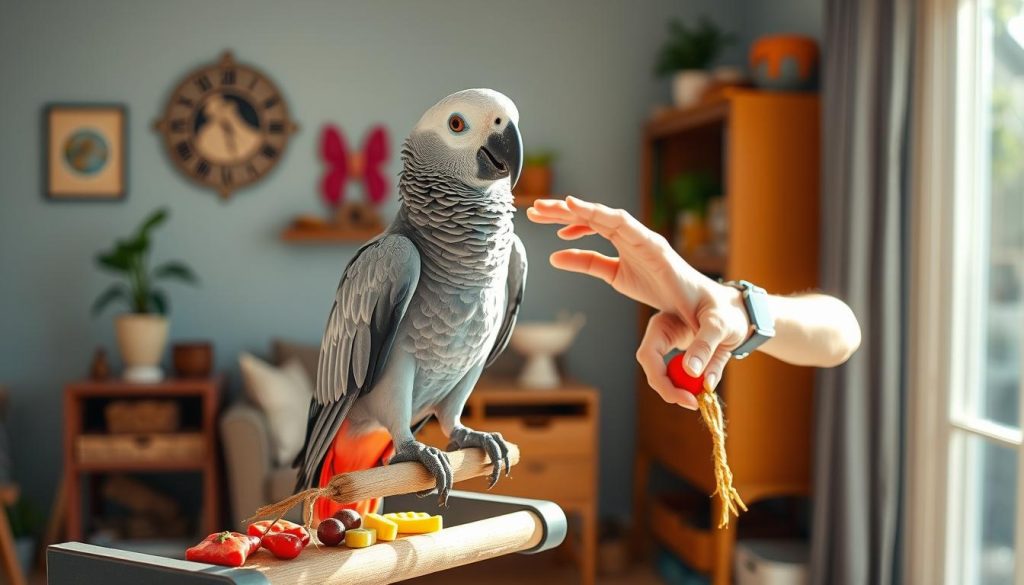
Socialization and Interaction
Your African grey parrot needs to be socialized to feel good emotionally. They enjoy being in a group and are happiest when they are involved with their loved ones. Make sure to spend each day with your parrot by talking, playing, or just enjoying each other’s company. The confidence and trust your parrot has in you can be built during early socialization.
Let your African grey parrot bird meet new people and get used to different situations with the family and guests. This way, they learn not to depend on one person and are not too afraid when meeting strangers. Children learn to cope with different people and places because they are regularly exposed to them.
| Activity | Frequency | Benefits |
|---|---|---|
| Training Sessions | Daily, 10-15 minutes | Mental stimulation, behavior shaping |
| Socialization Time | Daily, 30-60 minutes | Bonding, confidence building, adaptability |
| Playtime | Daily, 30-60 minutes | Exercise, mental stimulation, interaction |
Your African grey parrot will need regular training and socialization, and in return, you’ll have a well-behaved and confident animal by your side. Spending time on their education and interaction with you will improve your bond with your pet.
Common Health Issues in African Grey Parrots
As an owner of an African Grey parrot, it is important to understand some basic health concerns. This information helps you to maintain the health and happiness of your parrot. In this section, we’ll address nutritional deficiencies, respiratory infections and feather plucking.
Nutritional Deficiencies
Proper feeding is essential to keep it from suffering from nutritional problems. Calcium and vitamin A are often deficient in African Greys, and this can lead to weak bones and breathing difficulties. To avoid this, ensure to feed your parrot a balanced diet of fresh fruits and vegetables and top quality pellets made specifically for African Greys. Read up on disease in African Greys to be the best owner.
Respiratory Infections
Some infections that African Grey Parrots can have are called aspergillosis and psittacosis. The causes could be pollution, pressure or close contact with unwell birds. Symptoms of this illness are nasal discharge, problems with breathing and tiredness. If you believe your parrot is sick with an infection, get help from an avian vet right away.
To lower the chance of respiratory infections:
- Keep your parrot’s home clean and well-ventilated
- Keep your parrot away from cigarette smoke and other harmful fumes
- Quarantine new birds before they meet your African Grey
- Take your parrot to the vet regularly
Feather Plucking and Behavioral Problems
Feather plucking is a big issue in African greys. It can be from being bored, stressed, or sick. If your parrot starts plucking feathers, find out why and get help. Talk to a vet to check for health problems and a behaviorist for advice on how to stop it.
To stop feather plucking and other behavior issues:
- Give your parrot lots of things to do with toys, puzzles, and time with you
- Make sure your parrot has a big cage for exercise
- Keep a regular daily routine to reduce stress
- Feed your parrot a balanced diet and limit junk food
Knowing about common health issues in African grey parrots and acting early can help your parrot live a long, happy life.
In summary, African grey parrots face health issues like:
| Health Issue | Causes | Prevention |
|---|---|---|
| Nutritional Deficiencies | Unbalanced diet, lack of calcium and vitamin A | Provide a varied, nutrient-rich diet |
| Respiratory Infections | Poor air quality, stress, exposure to infected birds | Maintain clean environment, avoid airborne toxins, quarantine new birds |
| Feather Plucking | Boredom, stress, underlying health issues | Provide mental stimulation, spacious cage, consistent routine, balanced diet |
African Grey Parrot Talking Ability and Vocabulary
African grey parrots are famous for their amazing talking skills. They are among the most loved pet birds. These smart birds can learn hundreds of words and phrases.
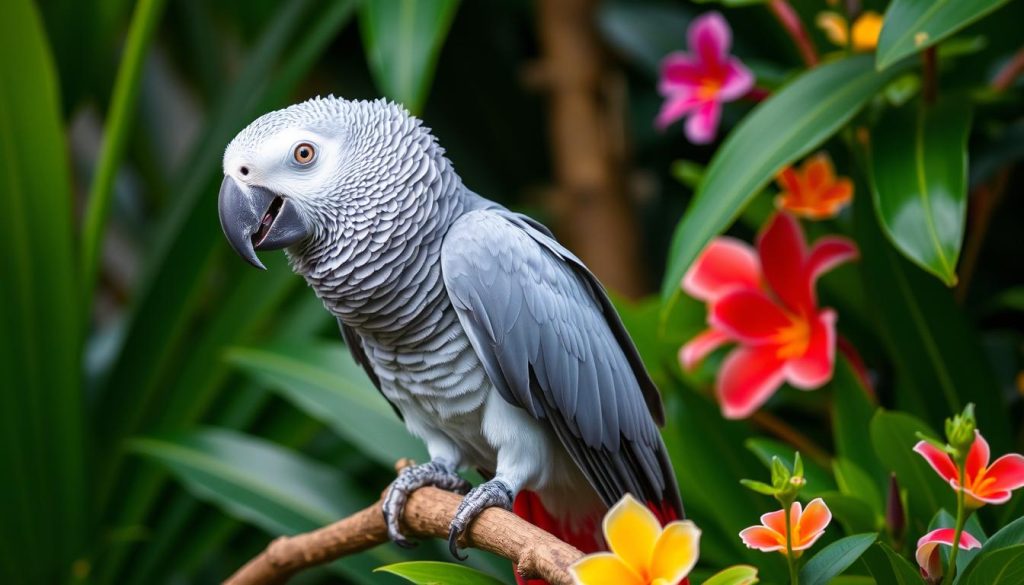
These parrots can mimic human speech clearly. They also understand language well, using words correctly. This makes them stand out from other parrots and shows their smartness.
“African grey parrots are like feathered geniuses, with a vocabulary that would put some humans to shame!” – Dr. Jane Goodall
To help your African grey parrot talk more, you should:
- Talk to your bird often
- Keep repeating words and phrases
- Give your parrot treats when they make sounds
- Make their environment fun for learning
Spending time and effort on your parrot’s language skills can really pay off. It will help them learn a lot of words and make your bond stronger.
| Age | Average Vocabulary Size |
|---|---|
| 1 year | 10-50 words |
| 2 years | 50-100 words |
| 3 years | 100-200 words |
| 4 years and older | 200+ words |
Every African grey parrot is different. Their talking skills depend on their genes, environment, and how much you train them. With patience and hard work, you can make your parrot a language expert. Enjoy having a pet that talks and keeps you company.
Choosing the Right African Grey Parrot for Your Family
When picking an African grey parrot for your family, think about several key factors for a happy relationship. Researching the different aspects of choosing an African grey parrot helps you make a good choice for both you and your new bird.
Age and Source Considerations
Deciding between a young or an older African grey parrot is a big step. Hand-raised birds are often more social and easy with people, great for beginners. Yet, older birds can be rewarding too, with a bigger vocabulary and a set personality.
It’s also key to know where your parrot comes from. Captive-bred birds are usually healthier and adjust better than wild ones. When looking at a breeder or store, ask about the bird’s history, health, and if it was bred or caught in the wild.
Personality and Temperament
African grey parrots have unique personalities and temperaments. Some are more outgoing, others more shy. Spend time with potential birds to see their personalities.
Choose a bird that seems lively, interested in its world. A healthy parrot has bright eyes, clean feathers, and eats well. Stay away from birds that look tired, have eye or nose discharge, or harm themselves, as these could mean health or behavior problems.
| Personality Trait | Description |
|---|---|
| Curious and Inquisitive | Enjoys exploring new objects and learning about their environment |
| Social and Affectionate | Thrives on interaction with their human family and craves attention |
| Intelligent and Resourceful | Quickly learns new skills and can problem-solve to achieve their goals |
| Independent and Strong-Willed | May have a mind of their own and require patience and consistency in training |
Choosing an African Grey Parrot that fits your family’s needs in age, source, personality, and temperament sets the stage for a great bond with your new bird.
Costs of Owning an African Grey Parrot
Thinking about getting an African grey parrot? It’s key to know the costs. The costs of owning an African grey include setup and maintenance.
Initial Setup Expenses
Starting with an African grey parrot costs a lot. You’ll need to pay for:
- Purchase price of the bird
- Spacious cage
- High-quality perches
- Food and water dishes
- Toys and enrichment items
- Initial veterinary check-up
The price of an African grey parrot varies a lot. It depends on the bird’s age, where it came from, and if it was raised by hand or its parents. Generally, expect to spend between $1,500 and $3,000 for a healthy, friendly bird.
Ongoing Maintenance Costs
There are ongoing costs to care for an African grey parrot. These are:
- High-quality pellets and fresh food
- Veterinary check-ups and potential medical treatments
- Grooming supplies (nail trimmers, beak conditioners)
- Replacement toys and cage accessories
- Potential boarding costs when traveling
Here’s a table to help understand ongoing costs:
| Expense | Annual Cost (USD) |
|---|---|
| Food (pellets and fresh produce) | $300 – $600 |
| Veterinary check-ups and potential treatments | $200 – $500 |
| Grooming supplies | $50 – $100 |
| Replacement toys and cage accessories | $100 – $300 |
| Potential boarding costs (per day) | $20 – $50 |
Ongoing costs for an African grey parrot can be high. Think about the long-term costs before deciding. These birds are smart and fun, but they cost a lot to care for.
Even with the high costs, owning an African Grey Parrot is rewarding. They bring joy, companionship, and mental challenges for those who love birds.
Conclusion
We have gone through a lot about the African grey parrot in this guide. We have discussed their needs for care, their intelligence, how long they live and their special characteristics. A happy and healthy African grey parrot bird needs good food, a nice place to call home and regular visits to the vet.
Having an African grey parrot pet is a commitment for many years. Being dedicated, patient and eager to learn is important. Get advice from bird owners, vets and people who study bird behavior. This will assist you in giving your parrot the best attention.
Taking care of an African grey parrot is not easy, but the benefits are great. Puzzles give you happiness, friendships and a unique brain workout. Providing for your pet bird and giving it love will help you form a close relationship with a bird that’s both intelligent and attractive.
FAQ
What is the lifespan of an African Grey Parrot?
African Grey Parrots can live for 40 to 60 years with proper care. They are a big commitment for pet owners.
How intelligent are African Grey Parrots?
They are very smart, like a young child. They solve problems well and learn a lot of language.
What are the different types of African Grey Parrots?
There are two types: the Congo and the Timneh African Grey. Congo Greys are bigger with light gray feathers. Timneh Greys are smaller with dark gray feathers.
How well can African Grey Parrots talk?
They can talk very well, learning hundreds of words. They mimic human speech clearly and use words correctly.
What should I feed my African Grey Parrot?
Feed them fresh fruits, veggies, and quality pellets. They need protein, calcium, vitamin A, and omega-3 fatty acids. Foods like nuts, seeds, greens, and cooked eggs are good sources.
How big should my African Grey Parrot’s cage be?
The cage should be big enough for them to move, climb, and play. Aim for a minimum size of 24″ x 36″ x 48″. Bigger is better.
How can I keep my African Grey Parrot healthy?
Keep them healthy with a balanced diet, a clean cage, and regular vet visits. They also need exercise and toys for fun and mental health.
What health issues are common in African Grey Parrots?
They can get nutritional problems, respiratory infections, and feather plucking. These often come from a bad diet, stress, or being near sick birds.
How much does it cost to own an African Grey Parrot?
Buying an African Grey Parrot is expensive, with costs for the bird, cage, toys, and supplies. Ongoing costs include food, vet visits, grooming tools, and replacing toys and cage parts.
